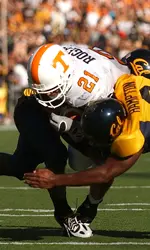University of Tennessee Athletics

Unity Council
November 15, 2007 | Football
The biggest payoff comes on Saturday afternoon.
To experience the Vol Walk, a run through the ???T??? and the passion of SEC football is reward enough for most Tennessee players.
But during the rest of the week, playing college football is more work than play. The hours spent practicing, in meetings and in class make for a regular 9-to-5 most days, and the ones that aren???t that long are usually longer.
For this reason, it???s important for the athletes to have the best working conditions possible. From locker room design to the daily schedule to the relationships with coaches and administration, every effort is made to keep the experience a positive one for Tennessee football players.????
Before the 2006 season, Coach Fulmer and the football administration devised a way they could receive feedback from the players on the day-to-day operations of the football team. They created the Unity Council, a committee of 11 players???one representing each position group???that meets with Fulmer on a regular basis to discuss how the teams??? experience can be improved.
???We obviously want our players to have the most beneficial time they can have here,??? Fulmer said. ???We looked for ways that we could get as much input as possible from them on how we do things, and the Unity Council is what we came up with. We knew of some similar ideas at other schools, and we built this to fit our needs here.???
The 2007 Unity Council consists mostly of seniors, but each class is represented. Erik Ainge represents the quarterbacks, Montario Hardesty the running backs and Austin Rogers the wide receivers. Ramon Foster serves on the council for the offensive line, and Brad Cottam serves for the tight ends.
For the defense, Xavier Mitchell represents the ends, J.T. Mapu the tackles, Jerod Mayo the linebackers and Jonathan Hefney the defensive backs.?? Daniel Lincoln and Casey Woods serve for the special teams units.
The council serves primarily as a sounding board for the coaching staff, a focus group of sorts for when the coaches and administration want to change the way something is done.
The coaches can explain the change to the Unity Council, which then takes the issue to the players for informal discussion. The players???especially the younger ones???are more likely to voice their opinions to a teammate than they are a coach.?? In return, the coaches hear opinions from players that they wouldn???t normally hear.
The result is a wider range of experiences from which the coaches can draw their conclusions.
???I think it???s important that we do it,??? Rogers said. ???Otherwise, I think a lot of issues would go unnoticed and a lot of concerns wouldn???t be voiced.
???The players are out working every day, so we know what we need to do our jobs. If we can make those needs clear to the people in charge, then everybody is a lot better off because the coaches and the football administration want us to have everything it takes.???
The role is not merely that of a middle man. The 11 young men on the committee are charged with representing every Volunteer football player, from the walk-on senior who practices every day because he loves the game to the superstar freshman who everyone thinks has a future at the next level. That???s a lot of different needs that have to be met, and a lot of different voices that have to be heard.
???Guys just don???t come up to us because we???re on the Unity Council and tell us they need another pair of socks or that they aren???t getting enough passes thrown to them,??? Mayo said. ???But we have to try and mold 100 different opinions into one idea, and that can be a challenge.???
This season, the Unity Council was sought out midseason to determine if the players liked a change in the regular practice schedule: moving the team???s off day from Sunday to Monday.
Before the season, the committee suggested to the coaches that they create a lounge in the Neyland-Thompson Sports Center locker room because of the amount of time the team spends there between meetings and practice. By the start of the season, leather couches were put in two corners of the room and televisions were hung from the ceiling.
???The team thought the locker room could be made more comfortable,??? Mayo said. ???We are hoping to get a lounge in the next couple of years, but we thought some things could be done between now and then to spruce up our second home.???
The advantages of the Unity Council don???t lie strictly in aiding the players??? college football experience. It also provides them leadership skills that can be used away from football for years to come.
???It is something we can take with us in the future,??? Woods said. ???I know I want to get into coaching, and having the leadership aspect of this as well as some knowledge on what issues players face every day will be helpful to me down the road.???
Whether or not ideas ever come to fruition or problems ever get solved, the Unity Council serves a great purpose in the Tennessee football program. It provides every player a voice, every coach and administrator a wide range of opinions on which to base decisions, and leadership experience to young men about to enter the working world.
When it works, it acts to remove the distractions and discomforts of the players??? ???work??? so that they can better focus on why they came to Tennessee in the first place:
Saturday afternoon.












